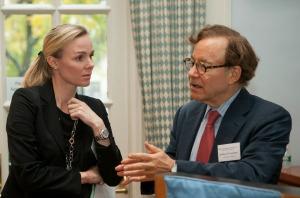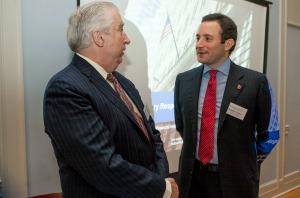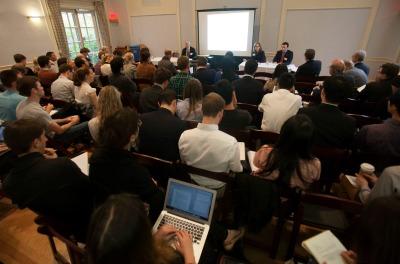Analyzing Global Financial Stability
Leading Experts, Government and Private-Sector Attorneys Gather at Columbia Law School to Take Stock of How Far the World's Regulators Have Come Since the Financial Crisis of 2008
New York, November 17, 2014—Financial regulatory policies have come a long way since the near-collapse of the markets in 2008, but they still have further to go, according to leading experts who spoke at a Nov. 6 conference sponsored by Columbia Law School’s European Legal Studies Center and the Richard Paul Richman Center for Business, Law, and Public Policy.
| Professor Anu Bradford, director of the European Legal Studies Center, with Professor Jeffrey N. Gordon, co-director of the Richard Paul Richman Center for Business, Law, and Public Policy |
“Enough time has passed to evaluate the financial crisis of 2008,” said Columbia Law School Professor Anu Bradford, the Henry L. Moses Professor of Law and International Organization and director of the European Legal Studies Center, in remarks to kick off the event. “Yet the regulatory environment is far from set; it continues to evolve around us.”
The conference, “A Global Agenda for Financial Stability: Have We Tamed the Too-Big-To-Fail Financial Institution?,” came just a week before 20 of the world’s most advanced and emerging economies met at the G20 Summit in Brisbane and was organized in part by Emiliano Tornese ’07 LL.M. a banking and financial services official at the European Commission.
The event featured panel discussions with experts and practitioners who experienced the financial crisis and resulting regulatory response firsthand, including: Sheila C. Bair, the former chair of the U.S. Federal Deposit Insurance Corporation and current chair of The Systemic Risk Council; Paul Tucker, former deputy governor of the Bank of England and current senior fellow at the Harvard Kennedy School and Harvard Business School; and Greg Baer, general counsel at JPMorgan Chase. The discussions were held under the Chatham House Rule, which precludes remarks being attributed to any individual or organization.
The panels were:
- The Lessons Learned From the Financial Crisis
- Regulatory Responses Across the Atlantic
- The Challenges Ahead in View of Brisbane: A U.S. and EU Perspective
One speaker said monetary and regulatory policy set the stage for the 2008 financial crisis.
| Professor John C. Coffee Jr., left, with Emiliano Tornese ’07 LL.M |
“The economy didn’t have to stumble much for the banking system to go bust,” the speaker said. “You need a Rolls-Royce resolution regime and some countries didn’t have any resolution regime at all. Sooner or later a crisis of this magnitude was inevitable. That feels like a sin in retrospect.”
Most panelists agreed regulators around the world are better prepared to handle any future crises although work remains to be done.
“We are clearly better off—indeed far better off—than we were in 2008,” one speaker said. “But we are not sufficiently there yet.”
Another panelist pointed out that no matter how well regulators prepare, the financial industry will always look to take advantage of the system.
“Regulatory arbitrage is endemic in finance,” the speaker said. “Finance is a shape shifter.”
Other expert participants were: H. Rodgin Cohen, senior chairman at Sullivan & Cromwell; Dianne Dobbeck, senior vice president and head of supervisory policy at the Federal Reserve Bank of New York; and David Schraa, regulatory counsel at the Institute of International Finance.
Several Columbia Law School faculty members participated in the conference in addition to Bradford: Jeffrey N. Gordon, the Richard Paul Richman Professor of Law and co-director of the Richman Center for Business, Law, and Public Policy; John C. Coffee Jr., the Adolf A. Berle Professor of Law; and Georges Ugeux, a lecturer. Columbia Business School Professor Patrick Bolton, the Barbara and David Zalaznick Professor of Business, also took part in the event.
| Guests heard from expert panelists at the conference, presented jointly by the European Legal Studies Center and the Richard Paul Richman Center for Business, Law, and Public Policy. |


